Table of Contents
An adjective clause is a group of words that describes a noun and adds extra information. It begins with words like who, which, or that and provides details about people, places, things, or ideas.
Adjective clauses add variety to language and improve communication. Learning to use them effectively enhances both speaking and writing skills.
What is Adjective Clause?
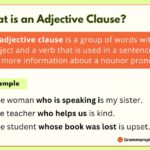
A relative clause, or adjective clause, provides extra information about a noun and acts like an adjective in a sentence. It usually follows the noun and begins with words like who, whom, whose, which, that, or where, when, why.
Examples:
The woman who is speaking is my sister.
The boy who is wearing the red shirt is my cousin.
The car which is parked outside belongs to my neighbor.
How to Use Adjective Clauses
Adjective clauses help provide more information about nouns in a sentence. Here’s how to use them:
Start with a Relative Pronoun:
Most adjective clauses begin with relative pronouns such as who, whom, whose, that, or which. These pronouns connect the clause to the noun it describes.
- The teacher who helps us is kind.
- The man whom I saw was very tall.
- The student whose book was lost is upset.
Follow the Noun:
One of the key rules when using adjective clauses is that the clause should immediately follow the noun it modifies. This helps keep the sentence clear and logical, ensuring that the reader easily understands what is being described.
- The car that I bought is blue.
- The house that we built is very spacious.
- The dress that she wore to the party was beautiful.
Add Details:
Adding details to adjective clauses enhances the description and provides more context about the noun. Here’s how you can expand the original sentence “The car that I bought is blue” with additional details.
Original Sentence:
- The car that I bought is blue.
Identification of Adjective Clauses
First, identify an adjective clause and describe the noun the clause describes. Then, look for relative pronouns or adverbs, such as who, whom, whose, which, that, where, when, or why.
Ensure that the clause follows the noun it modifies and check that it adds extra details about that noun.
Begins with a Relative Pronoun:
Most adjective clauses start with words like who, whom, whose, which, or that. Sometimes, they may also start with where or when if the clause modifies a place or time.
- The book that you gave me is amazing.
Follows the Noun It Modifies:
The adjective clause usually comes directly after the noun or pronoun it describes.
- She is the teacher who helped me.
Contains a Subject and Verb:
Like all clauses, an adjective clause has a subject and a verb, making it a complete clause.
- The man who is wearing the hat is my uncle.
Example Sentences
- The car that she bought is very expensive.
- I know the man who lives next door.
- This is the house where I grew up.
- The teacher whom we met was very kind.
- The book which you recommended is a bestseller.
- The cake that my mom baked was delicious.
- She has a friend who can speak five languages.
- The movie that we watched last night was really scary.
- The person whose phone rang during the meeting apologized.
- He is the doctor who treated me last year.
- The dress that she is wearing looks beautiful.
- The city where we met is very special to me.
- The letter which was sent yesterday arrived today.
- I don’t like people who are always late.
- The dog that barked all night belongs to our neighbor.
Why Adjective Clauses Are Important
Adjective clauses play a crucial role in making sentences more descriptive, informative, and engaging. Here are the key reasons why adjective clauses are important:
Add Detailed Descriptions:
Adjective clauses provide extra information about nouns and pronouns, helping readers understand more about the subject. Instead of using a single adjective, an entire clause can describe a noun with greater depth.
- The man who lives next door is a doctor.
The adjective clause adds important details about which man is being talked about.
Clarify and Specify Information:
Adjective clauses can distinguish between different people, places, or things. They help clarify which person or thing the speaker is referring to, making the meaning clearer.
- The book that I borrowed from the library was fascinating.
This clause specifies which book is being referred to.
Provide Non-Essential Information:
In some cases, adjective clauses offer additional, non-essential information that enriches the sentence without changing its core meaning. These clauses are often set off by commas, adding a layer of detail without cluttering the sentence.
- My car, which is blue, is parked outside.
The color of the car is additional information but not essential to the sentence.
Adjective Clause vs. Adjective Phrase
The main difference between adjective clauses and adjective phrases is to offer simpler descriptions and do not have a subject-verb structure. Adjective clauses provide detailed descriptions and contain both a subject and a verb.
Adjective Clause:
An adjective clause is a group of words that describes a noun and contains a subject and a verb. It typically begins with a relative pronoun like who, which, that, etc.
- The teacher who inspired me is retiring.
- The book that I read last month was thrilling.
- The car which is parked outside belongs to my neighbor.
Adjective Phrase:
An adjective phrase is a group of words that functions as an adjective but does not contain a subject and a verb. It often includes adjectives along with modifiers.
- The very tall building is the tallest in the city.
- The car in the driveway is mine.
- The girl with the blue dress is my sister.
Common Mistakes
Misplacing the Clause:
Sometimes, the clause is placed too far from the noun it describes, causing confusion.
❌ The car is blue that I bought last year.
✅ The car that I bought last year is blue.
Choosing the Wrong Relative Pronoun:
Choosing the incorrect relative pronoun can make sentences unclear.
❌ The teacher whom is kind.
✅ The teacher who is kind.
Omitting the Relative Pronoun:
In some cases, people forget to include the relative pronoun.
❌ I have a friend lives in Paris.
✅ I have a friend who lives in Paris.
Not Using Commas for Non-Restrictive Clauses:
Not using commas for non-restrictive clauses can lead to misunderstandings.
❌ The book that is on the table is mine.
✅ The book, which is on the table, is mine.
You May Also Like

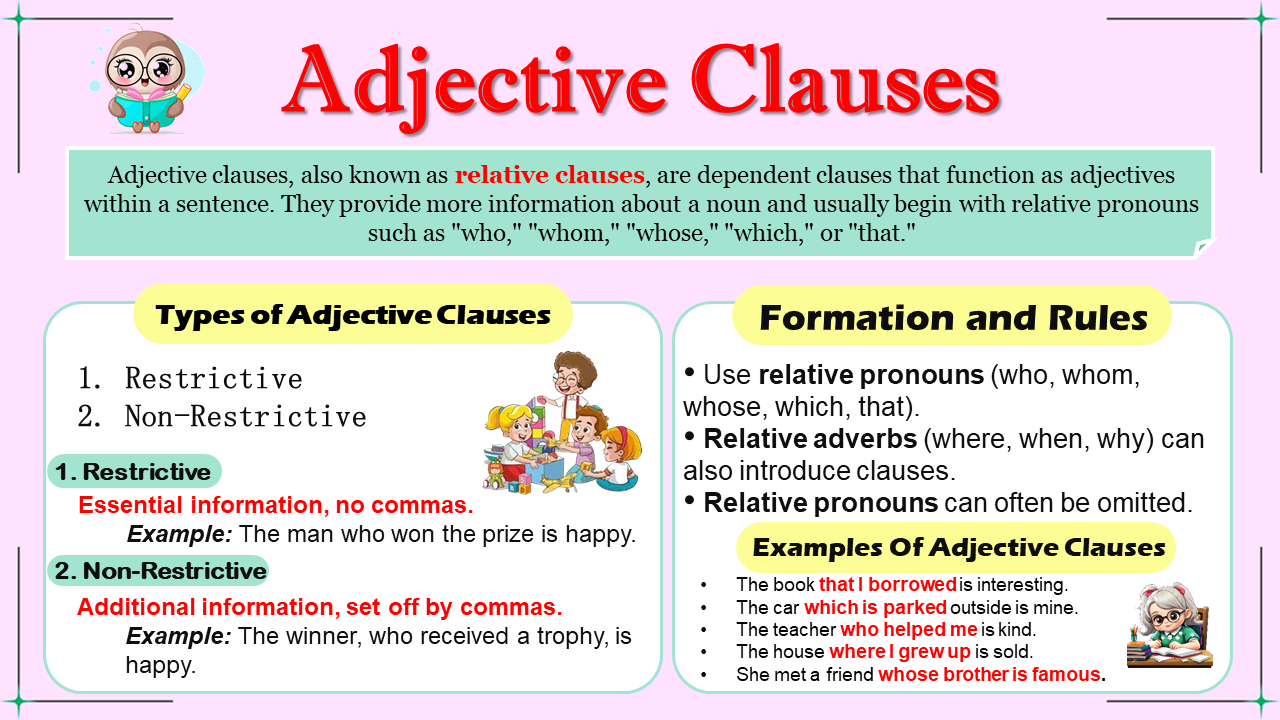
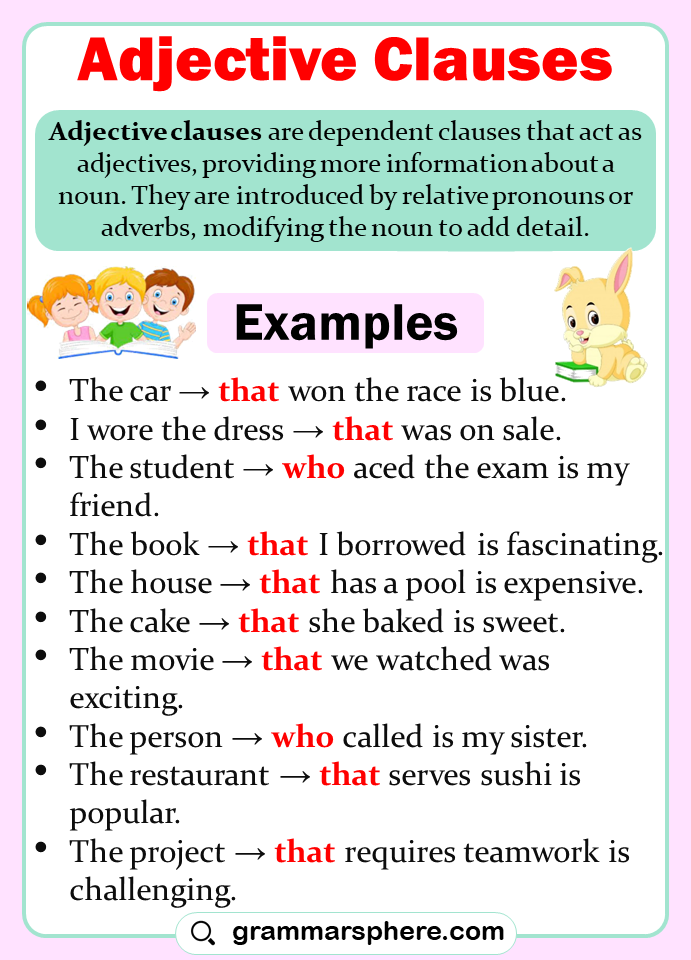
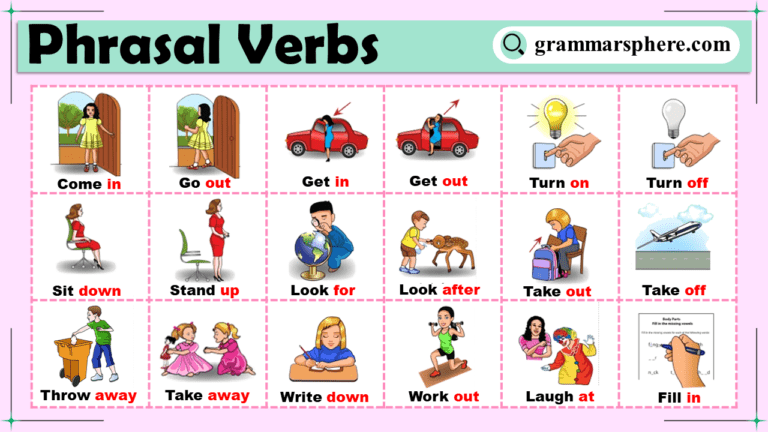
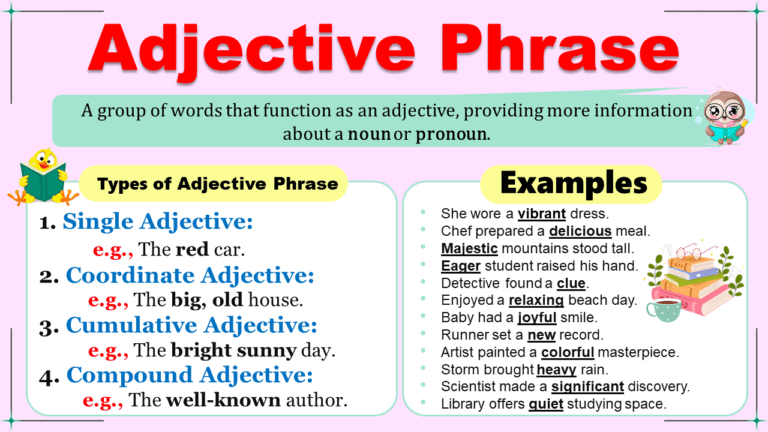
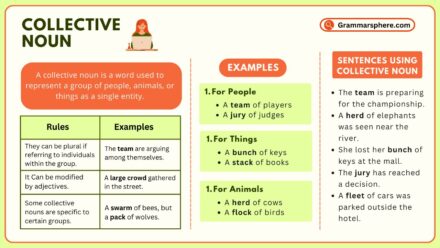
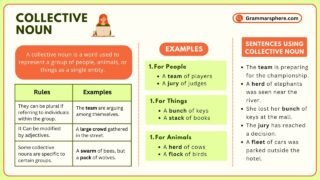
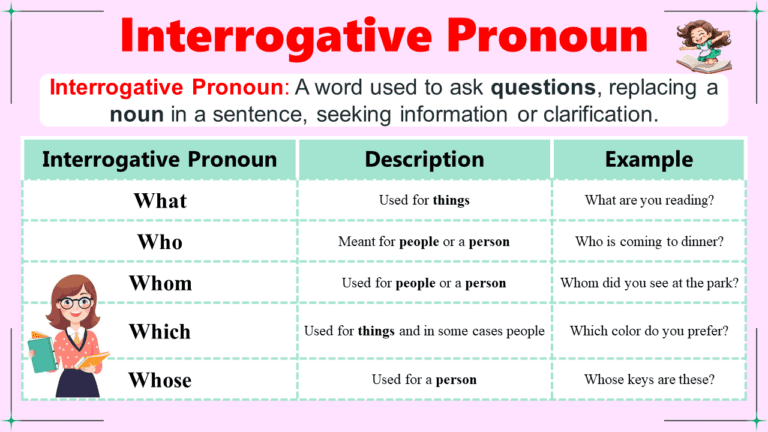
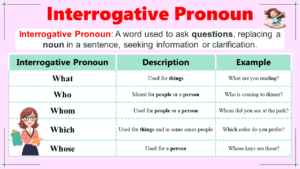
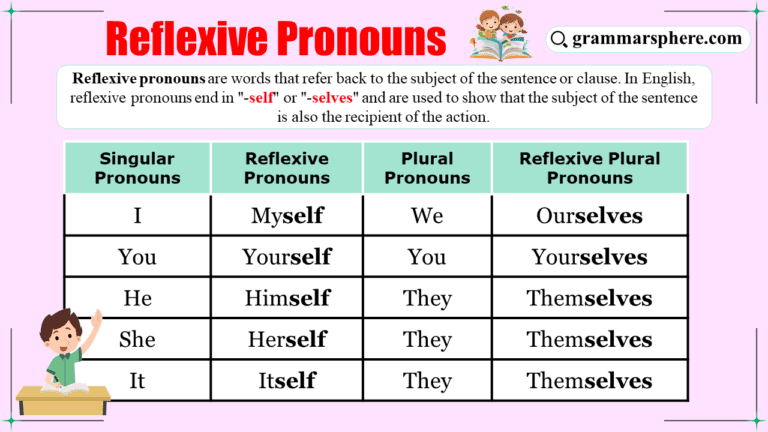
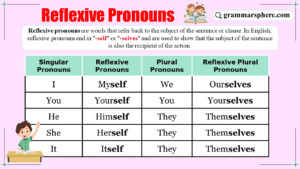
Leave a Comment